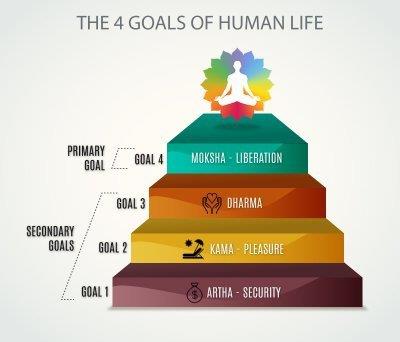Moksha is the ultimate goal of life in Sanatan Dharma. It is the state of being free from the cycle of birth, death, and rebirth. Moksha is also known as liberation, nirvana, or salvation.
There are many different paths to moksha in Sanatan Dharma. Some people believe that it can be achieved through meditation, yoga, or other spiritual practices. Others believe that it can be achieved through selfless service to others.

The concept of moksha is a complex one, and there is no one right way to understand it. Each person must find their own way to understand moksha and its place in their own spiritual journey.
Here are some of the key beliefs about moksha in Sanatan Dharma:
- Moksha is the ultimate goal of life.
- Moksha is the state of being free from the cycle of birth, death, and rebirth.
- Moksha is a state of perfect happiness, peace, and knowledge.
- Moksha can be achieved through a variety of paths, including meditation, yoga, selfless service, and devotion to God.
Moksha is a central concept in Sanatan Dharma and has a profound impact on how Hindus view the world. It teaches that our actions in this life have consequences for our future lives, and that we should strive to live a good and virtuous life in order to achieve moksha.
Moksha is also a source of comfort for Hindus who have lost loved ones. It teaches that death is not the end, and that our loved ones will be reborn into new lives. This can help to ease the pain of loss and give hope for the future.
Here are some of the ways to achieve moksha in Sanatan Dharma:
- Meditation: Meditation is a practice of focusing the mind on a single point, such as the breath or a mantra. Meditation can help to calm the mind and body, and can lead to a deeper understanding of the self and the universe.
- Yoga: Yoga is a physical and mental discipline that combines postures, breathing exercises, and meditation. Yoga can help to improve flexibility, strength, and balance, and can also lead to a deeper understanding of the self and the universe.
- Selfless service: Selfless service is the act of helping others without expecting anything in return. Selfless service can help to develop compassion and empathy, and can also lead to a deeper understanding of the self and the universe.
- Devotion to God: Devotion to God is the act of loving and worshiping God. Devotion to God can help to develop faith and trust, and can also lead to a deeper understanding of the self and the universe.
These are just a few of the many ways to achieve moksha in Sanatan Dharma. There is no one right way to achieve moksha, and each person must find their own path.